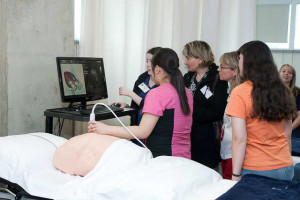Becoming an ultrasound technician necessitates earning proper certification from an accredited program. You must have the appropriate ultrasound technician degree, which is most commonly an associate’s degree. Certificates, bachelors and masters degrees are also available. When you finish training, you must then take licensing and certification exams, which vary depending on your state and specialty. If you pass these, you can then enter the profession. Employers prefer candidates with a lot of experience, so you should seek out ultrasound technician certification in several areas. Basically, the more experience you can get in training the better, so it is a good plan to take an extra internship if your schedule allows it.
There are 1-year certificate programs available to become a sonographer, but these are only considered appropriate for those who are cross-training into the field from another medical area, such as radiology or nursing. Such fields are closely enough related that you can easily apply what you already know to Sonography, mastering the skills quickly. You might even be able to arrange on-the-job training at the healthcare facility where you already work, so that a job will be ready for you once you achieve your ultrasound technician certification.
 The majority of ultrasound tech schools offer 2-year associates degrees. These rigorous programs teach you didactic courses in Sonography, physics, anatomy and patient care, combined with several clinical rotations in assorted areas of Sonography. When you receive your ultrasound technician degree, you will usually need to take exams for certification. What certifications are necessary will depend on your location and specialty. Your region may not require a license but many employers prefer that you be licensed before you begin practicing. If you are already working in the field and are interested in pursuing further ultrasound technology career advancement, you might earn a bachelor’s degree. This will enable you to go into healthcare management and work for the government in shaping health policy.
The majority of ultrasound tech schools offer 2-year associates degrees. These rigorous programs teach you didactic courses in Sonography, physics, anatomy and patient care, combined with several clinical rotations in assorted areas of Sonography. When you receive your ultrasound technician degree, you will usually need to take exams for certification. What certifications are necessary will depend on your location and specialty. Your region may not require a license but many employers prefer that you be licensed before you begin practicing. If you are already working in the field and are interested in pursuing further ultrasound technology career advancement, you might earn a bachelor’s degree. This will enable you to go into healthcare management and work for the government in shaping health policy.
The highest ultrasound technician degree available is a master’s degree. If you are interested in research, publication and teaching, as well as working in the upper echelons of management and public policy, a master’s degree will help you get there. Many of these positions will allow you to earn a higher ultrasound technician salary. You should be aware, however, that the Commission on Accreditation of Allied Health Education Programs (CAAHEP) accredits very few ultrasound tech schools at the master’s degree level.
All ultrasound technician schools will insist that you undertake 1 or more clinical rotations during your course of study. You can gain further experience through an extra internship if you want an additional ultrasound technician certification on hand when you leave school. You can start an internship even before you enter your program, and it can be a great way to secure a job once you are certified.
Finally, it can be helpful to join a professional organization, such as the Society of Diagnostic Medical Sonography. In addition to being able to access more job boards and make contacts, it demonstrates your professionalism and commitment to the field.
Recent Comments